
by Ms. V. (South Korea) | Nov 19, 2013 | 2013, Education, Korea, South Korea, World Moms Blog, World Voice
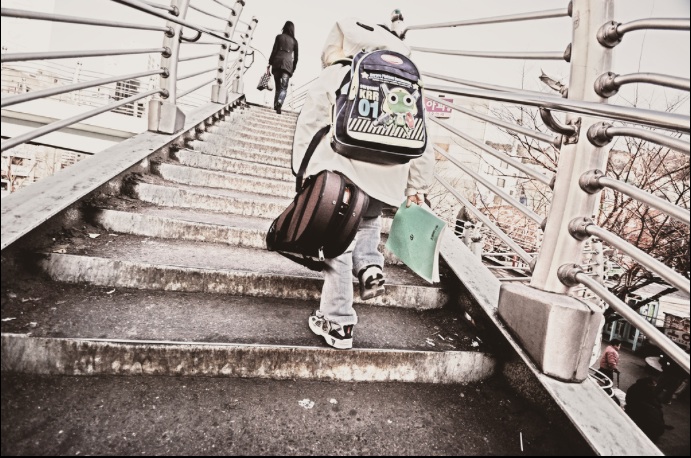
Photo Credit : Mafuyou/Flicker Creative Commons
Last week over 650,000 South Korean students took their college entrance exams. To give you an idea of how important this day is to Korean families, consider the following: banks and government offices open late, air traffic is rerouted, extra metro trains and buses are added to the schedule, and police officers are deployed to ensure that students arrive on time for the exam. In addition to this many of the parents of these students spend the 100 days leading up to the exam fervently praying at temple, performing 3,000 bows for good luck.
What is perhaps most striking about this yearly ritual, as an outsider looking in, is how everyone in the country sees it as their duty to ensure that these students make it on time and do well on their exams. The amount of pressure to succeed academically is unlike anything I’ve ever witnessed.
South Korea does indeed lead the world in measurable academic success. They have one of the highest rates of literacy in the world, in addition to scoring very high on international standardized tests, especially when compared to Western nations. Unfortunately, South Korea also leads in the world in another unfortunate and surprisingly related area: suicide.
As of 2011, suicide is the leading cause of death among South Koreans under the age of 40. In the age group from 15-24, worry over academic performance is cited as the reason. Every year after the exams there are reports of these “Exam Suicides”.
Suicide affects every culture, not just this one, but it is deeply troubling to observe just how widespread it is here, not only among young people, but within the general population as well. Long seen as a private and personal issue, the government has finally taken steps in recent years to stem the tide. There are call centers and prevention groups receiving government funding, as well as dedicated employees who search the internet and social media for suicide-related posts. Within the last few months a specific type of pesticide was banned, as it had been commonly used in suicides.
Preventing access to means and providing support will be effective up to a point, but perhaps a closer look must be taken at the cultural obsession with academic success. I was thinking of all those kids taking the test last week, wondering how it must feel to know that the entire country is invested in how you do on this test. Such immense pressure! I can’t even imagine.
As I have mentioned in previous posts, South Korea is at a very interesting point culturally. It has rapidly modernized and continues to do so while still having deep roots to the Confucian principles that have guided society for generations.
It is the intersection of new economic realities and globalization with older traditions of filial piety and family honor that seem to be most challenging to navigate.
As long as suicide is seen as an honorable exit because of failure to live up to expectations or, in the case of older people, to unburden the family from the need to provide for aging relatives, the numbers will at the very least remain somewhat steady. As the culture changes, so too will the rates of suicide, I suspect.
But how many people’s children will die in the meantime?
The results of the exams will be announced on November 27th. Until then, we all wait, hope, and pray.
This is an original post written for World Moms Blog by S. Korean Contributor Ms. V.
Do you think it is possible to have such academic success without all the pressure?
Ms. V returned from a 3-year stint in Seoul, South Korea and is now living in the US in the beautiful Pacific Northwest with her partner, their two kids, three ferocious felines, and a dog named Avon Barksdale. She grew up all over the US, mostly along the east coast, but lived in New York City longer than anywhere else, so considers NYC “home.” Her love of travel has taken her all over the world and to all but four of the 50 states.
Ms. V is contemplative and sacred activist, exploring the intersection of yoga, new monasticism, feminism and social change. She is the co-director and co-founder of Samdhana-Karana Yoga: A Healing Arts Center, a non-profit yoga studio and the spiritual director for Hab Community. While not marveling at her beautiful children, she enjoys reading, cooking, and has dreams of one day sleeping again.
More Posts
Follow Me:


by hjunderway | Nov 18, 2013 | 2013, Bilingual, Cultural Differences, Culture, Education, Expat Life, Eye on Culture, France, International, Living Abroad, Milestones, Motherhood, Moving, Preschool, Relocating, School, Stress, Traditions, USA, Working Mother, World Moms Blog, World Motherhood, Younger Children
 The day I gave birth to my son, HJ, is a day I’ll never forget. Induction nightmare? Check. Post baby snuggles? Check. September 3rd birth date? Check.
The day I gave birth to my son, HJ, is a day I’ll never forget. Induction nightmare? Check. Post baby snuggles? Check. September 3rd birth date? Check.
Little did I know at the time how much my son’s birthday would impact his development and education but flash forward to 2013 and here I sit, faced with the first of many educational concerns.
Living in Paris meant that on September 4th, 2012, my son formally entered the French education system. At just three years old, he was invited to attend nursery school, or maternelle, which comprises the first three years of schooling. Due to his inability to speak French, my son was invited to attend school four mornings per week from 8:30 a.m. until 11:40 a.m. As he began to thrive in school, his teacher gently suggested that I begin leaving him for one full-day per week after the holiday break in December. By late-January, he was attending school all day until 4:15 p.m., eating French catered lunch in the cantine (cafeteria), enjoying rest time, and thriving.
Combining his easy going attitude and tall stature (95% percentile for height), most parents thought my son was one of the older kids in the class. In order to start school in September, children must turn three by December 31st, and with a September 3rd birthday, my son was one of the younger students. When I would share this with the parents, they’d say, “Wow, but he is so tall!”
Our plans for HJ’s education were that he would be in French school until we moved home, and at that point he’d transition into kindergarten at the local school. When our contract ended sooner than expected, I began the joyous task of figuring out what options we had to continue HJ’s formal education, and the results were shocking.
HJ misses the US cut-off for kindergarten by two days. This means that he has to wait until he is six to enter kindergarten! I neatly placed that reality aside and instead focused on what education he could receive now, at four years old.
My choices floored me.
Option A) the public school offers a “lottery” for kids ages 3-4 for preschool, and the schedule only allows kids to get one of three spots: two mornings from 8-11, three mornings, four afternoons, or five mornings. And all this for the staggering price of more than $6,000.
Option B) the local Montessori school, which has no openings until September of 2014, and again runs mornings only. Did I mention that they also refused to reveal the actual cost of the program?
And finally, Option C) a local Catholic school that offers five all-day classes for around $7,000.
So what’s the big deal?!
Children in France have access to all-day education beginning at age three for FREE, with master’s degree trained teachers. While every school isn’t as amazing as the one my son attends, the French may be on to something. For two working parents, morning-only, formal education settings are an inconvenience, and for single-income families, shelling out over $6,000 for a few hours a day may be too much.
All around the United States, parents are struggling with making hard financial decisions and I wonder if it seems fair that we have to do so when it comes to our children’s educations?
For us, having HJ evaluated and exploring how he measures up to his peers is one solution. How he falls in the range of social and emotional intelligence will give us a window into how he may fair in kindergarten and will be necessary if we plan on fighting the school district for a spot in kindergarten if it seems logical and appropriate for our son.
The second option is to just ride the wave and instead allow our six year old to join his peers, perhaps giving him a leg up on his classmates. Then I question, “Will he be bored?” “Too big?” At this point I’m just not sure which choice is best for our little guy but it did get my wheels moving, wondering about the significant differences in how each country approaches education. What is it like for children in Germany, or Canada? Do parents struggle with similar issues in Sydney, Australia?
So please, World Moms Blog readers, share your location/country’s educational process! When does school begin? When did your children start school? Anything you wish you could change about your child’s educational experiences?
This is an original post to World Moms Blog from Jacki, mother of one now living in XXX but formerly blogging from Paris, France.
Jacki, or “MommaExpat,” as she’s known in the Internet community, is a former family therapist turned stay-at-home mom in Paris, France. Jacki is passionate about issues as they relate to mothers and children on both domestic and international scenes, and is a Volunteer Ambassador for the Fistula Foundation. In addition to training for her first half marathon, Jacki can be found learning French in Paris and researching her next big trip. Jacki blogs at H J Underway, a chronicle of her daily life as a non-French speaking mom in France.
More Posts
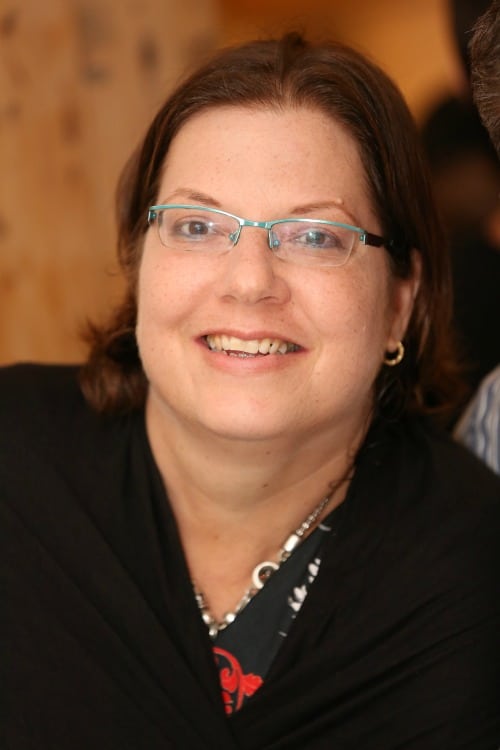
by Susie Newday (Israel) | Nov 16, 2013 | 2013, Cancer, Health, Israel, Susie Newday, World Motherhood

Neta sat down with World Mom contributor, Susie Newday in Israel to talk about living her life with metastasis breast cancer.
This is part two of our contributor and cancer nurse, Susie Newday’s, moving and in depth interview on breast cancer with her close friend. Grab a cup of something warm, and come be a fly on the wall with us, as two friends discuss living with metastatic breast cancer. There is something for us all to learn. (Click to catch up and read Part I, first.)
Susie: You know what I remember? I remember before I worked in oncology, when you were diagnosed for the first time. You were waiting for your scan results to see whether there was any metastases and you said to me, “If I have metastasis, my life is over.” When you were diagnosed with the recurrence was that the same feeling you had?
Neta: Yes, that was my feeling. I said to myself, I’m screwed. With metastasis you don’t recover. You get another year or two.
S: Or maybe longer.
N: I have to say that I have a hard time believing that. I don’t really see that in the cards.
S: I wish you many more years.
N: I wish. And I thank you very much, and I hope I do. I’m not saying I want to die, I don’t. I’ll be happy to be surprised for the good but the feeling is that this is the end.
S: You walk around with the feeling everyday?
N: Now it’s less. Since I lived through the setback I had with the bleeding in my brain, and everyone told me that I’m a medical miracle, I now say to myself that maybe there are miracles out there.
I am more open to the possibility that maybe there will be a miracle here, something I refused to believe beforehand when my cancer recurred.
S: Tell me what happened with your setback and the hospitalization.
N: When I was rediagnosed, I was receiving Aredia to strengthen my bones and a biological treatment that was part of a clinical trial. I went back to work. About two or three months after that I began having severe weakness. My hemoglobin kept going down and they decided to hospitalize me. My oncologist told me that the cancer has reached my bone marrow. I was hospitalized in the regular medical ward for a week and a half until space opened up in the oncology ward and then they moved me. I received blood transfusions and chemotherapy.
A day or two after I was moved, I started having confusion, and then I couldn’t see. For about 5 days I had what seemed like a gray veil over my eyes. I don’t remember much but they told me I was really confused, and they had to appoint a legal guardian to make my medical decisions. To do that I needed an interview with the psychiatrist. He asked me a lot of questions which I don’t remember,
but I do remember that he asked me how old my children were and I couldn’t tell him. I knew their names but not their ages.
My husband brought the kids to visit me, but afterwards he told me that it was a difficult decision whether or not to bring them because I couldn’t see, and they didn’t want the kids to get scared. He had consulted with the psychologist who said to bring them because it’s better for them to see their mother even if she is confused and doesn’t see than not to see her.
It was 5 very difficult days. They ran all kinds of tests from eye tests to an MRI. I remember being very afraid before the MRI. I remember them saying it’s a very important test to see what’s going on. Inside the machine everything was rotating, and there was a horrible noise. I remember it being very traumatic, also the MRI test itself and also the fact that I knew it was a very important test, and I didn’t know what they were looking for. After the fact, I now know they were looking for metastases in the brain. They didn’t find any, it was only a brain bleed, and then they said the situation is better than they thought.
I don’t remember everything from those days. I remember people coming to visit. I recognized the people who came.
Later on, I found out that my husband already prepared the older girls a bit to expect the worse. They said psalms, and no one really thought I was going to recover because my medical state was not good. Then on the fifth day I woke up in the morning, my mother came into the room, and I was able to see her.
The doctors came, and they did tests. My eyesight came back, but slowly. Even now I can see perfectly from far but my vision from close is still impaired and interferes with reading. But at least I see the world, I see things. I don’t need help walking.
Since that incident I say to myself maybe there is some kind of miracle going on here, maybe there is some kind of divine intervention. In the hospital everyone was saying they had never seen someone recuperate like I did with their eyesight returning. Maybe it had something to do with my willpower. After my husband was diagnosed, I realized why it was that I pulled through, why I’m still here. I’m here to organize things and take care of my family. It is much harder when both parents are ill. I couldn’t “go” and leave my husband here alone to also fight his disease and raise the children because it is impossible to do. Apparently someone up above realized that I’m still needed here. That’s the answer I give myself. No one has said that to me, I just feel it. No one has answers but after my husband was diagnosed with cancer I just understood why I am still here.
S: When was your husband diagnosed?
N: January 2013. He was admitted with a bowel obstruction and then was diagnosed with Metastatic Colon Cancer. He was diagnosed about 2-3 months after my prolonged hospitalization, and I hadn’t really recuperated yet. I had slowly been getting better. I would be hospitalized for a week or so and then released and then hospitalized again for a week. It was a big shock having another person in the family sick. When he wasn’t feeling well and needed to go to the Emergency Room I still wasn’t feeling great and I couldn’t drive. His brother came and picked him up.
S: What was going through your head when your husband was diagnosed?
N: That someone up above is crazy. It’s not just that I’m sick, and now he’s sick. It’s the fact that both of us are in a situation where the doctors are not optimistic. It’s not a situation where you can say to yourself that I will definitely beat this. It could be 1, 2 or 3 years. No one has any idea how long you have for sure. I said to myself and to God, why him? * He is such a good person. For sure he hasn’t sinned. Maybe I sinned unwittingly but him? With my husband it seemed like a different level, it was like he doesn’t deserve this. He is such a good person.
S: And you deserve it?
N: No. But HE is really a good person. He’s a better person than me. He has a good heart, he doesn’t hurt people. * I just couldn’t reconcile how it was possible that he could be sick because he didn’t deserve it because he is such a good person. You start saying to yourself that God went crazy. Is there no justice in the world? Two young parents with 4 children are both now sick. Something went wrong. Either God is putting us through some great trial or I don’t know what. It’s not fair. I felt very strongly that it was just not fair that he was sick too, it was enough that I was sick.
*(I went to get some tissues at this point for her, which were easy to find because as she said there are lots of tissues in her house.)
S: I think that women and especially mothers don’t see ourselves the way other people see us. We are very generous towards other but we don’t cut ourselves any slack. I’m flabbergasted how you’re talking about how your husband doesn’t deserve this to happen to him and you do? (We both started laughing at that point)
N: He is the kind of person who if you ask directions on how to get somewhere, even if it’s out-of-the-way he will take you there. I would try to explain, I would not take anyone all the way there.
S: What good things do you see in yourself, what things do you do that are good and that are unique to you?
N: I have more sensitivity to people. My husband doesn’t see certain things that I’m more intuitive about, also in life and also in work. Part of my job was to be sensitive to kids. I have more sensitivity to my surroundings which my husband might sometimes miss because he just doesn’t see it. I can be a good friend. As far as the kids, I’m more involved, I am with them more. I never said I don’t do good things. My husband is just good.
S: Were you always as involved with your kids or is it more since you have been sick?
N: It was always very important for me to be a mother, to be with the kids. The thing that stressed me out the most when I got sick was the kids, what’s going to be with the kids. I still struggle with that. I was always with them. After my births I took extended maternity leave. I saw motherhood as a very important role. I always had that, it’s not something that started now.
(For the full series: click here to read Part I, click here to read Part II, click here to read Part III and click here to read Part IV.)
This is an original post to World Moms Blog by our Africa and Middle East Editor, Susie Newday, in Israel.
Photo credit to the author.
Susie Newday is a happily-married American-born Israeli mother of five. She is an oncology nurse, blogger and avid amateur photographer.
Most importantly, Susie is a happily married mother of five amazing kids from age 8-24 and soon to be a mother in law. (Which also makes her a chef, maid, tutor, chauffeur, launderer...) Susie's blog, New Day, New Lesson, is her attempt to help others and herself view the lessons life hands all of us in a positive light. She will also be the first to admit that blogging is great free therapy as well. Susie's hope for the world? Increasing kindness, tolerance and love.
You can also follow her Facebook page New Day, New Lesson where she posts her unique photos with quotes as well as gift ideas.
More Posts - Website
Follow Me:






by Martine de Luna (Philippines) | Nov 14, 2013 | 2013, Cultural Differences, Humanitarian, Humanity, Natural Disaster, Philippines, World Events, World Motherhood
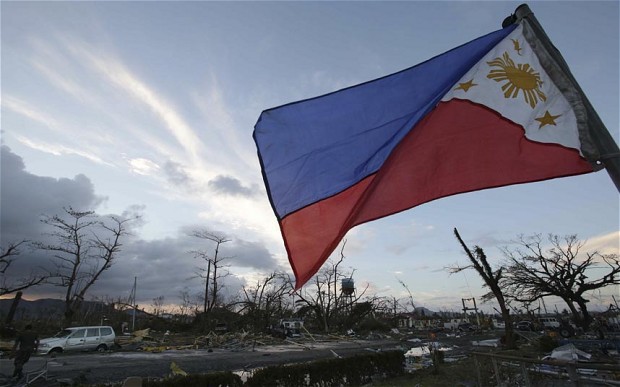 There are just no words these days to describe what has happened to my beautiful country. I write this from the capital of Manila, which was spared the catastrophic effects of the world’s strongest recorded typhoon, Haiyan, which befell our country last November 8.
There are just no words these days to describe what has happened to my beautiful country. I write this from the capital of Manila, which was spared the catastrophic effects of the world’s strongest recorded typhoon, Haiyan, which befell our country last November 8.
The most affected regions are in the Southern region, the Visayas. These islands comprise some of our top tourist destinations, and are home to some of the world’s most beautiful beach landscapes, including the famous Boracay island, Bohol, and Palawan, where we have several world heritage churches and protected coral reefs.
Today, we don’t know what will come of these cities, which have all been ravaged by nature’s cruelest storm to date.
Watching CNN is both helpful and heartbreaking. Helpful, because it keeps us attuned to what’s going on; heartbreaking, because the images they show slowly wear away at the human heart. Daily — sometimes by the hour — we receive more news about the worsening situations in the Southern Philippines.
Our country is in shock. I know it would be easy for some to blame our government, too, and not that I am a hundred percent in agreement with the way things are run, but I also believe our President and officials of the affected cities are in shock, too. The finger-pointing and guilt-tripping on social media disgusts me, to the point that I’ve sometimes stayed off for hours, just to filter out the negativism. (more…)
Martine is a work-at-home Mom and passionate blogger. A former expat kid, she has a soft spot for international efforts, like WMB. While she's not blogging, she's busy making words awesome for her clients, who avail of her marketing writing, website writing, and blog consulting services. Martine now resides in busy, sunny Manila, the Philippines, with her husband, Ton, and toddler son, Vito Sebastian. You can find her blogging at DaintyMom.com.
More Posts

by Sisters From Another Mister | Nov 12, 2013 | 2013, Humanitarian, Shot@Life, Social Good, Vaccines, World Moms Blog
The next twitter party will take place today Tuesday, November 12th
from 1-2pm EST, and later in the day,
another one at 9-10pm EST to accommodate time zones on MDG4!
The hashtag is #Moms4MDGs,
and we encourage all moms around the world to join in the discussion!
This month’s topic is child survival!

There are many bright spots in my life for which I am very thankful and writing for World Moms Blog is definitely a highlight. The lovely Jennifer being a close friend is another. World Moms Blog, a group of writers spread across the globe – are near and dear to me and thanks to Jenn, I was asked to be a Champion for Shot@Life which brought another group of ladies into my life that have blessed me beyond measure.
Hang on a second … here we go … an impromptu gathering on the streets of NYC!

Social Good Summit NYC
I would go anywhere in the world with these ladies!
And just what can all this goodness get together and do?
We can use our voices for change, we can use our voices for good, and together we can make a difference. Thanks to shot@life I step out of my comfort zone from time to time, earlier this year I interviewed a radio personality – on air. Yes – LIVE! For their Get a Shot/Give a shot campaign with Walgreens. Then at the Social Good Summit – I spoke on stage, well, I possibly shook more than I spoke … baby steps indeed compared to the hugeness of acts of others, but I am feeling my way, trying to make a mark in the world, and hoping to teach my children that we have a responsibility to those less fortunate along the way.
November 12th is World Pneumonia Day, I have had pneumonia twice in the last year and a half. It was not pretty. I was told that the lungs are our grief organ, so perhaps while I wanted everyone to believe on the outside that I was doing just fine, my body called my bluff. But here in the US, I had breathing treatments, steroids, medical attention and the option to have the vaccine the minute my body was ready for it. Elsewhere in the world, under different circumstances – my future may have hung in the balance.
Did you know that …
Pneumonia is the #1 killer of children under age 5 worldwide. 99% of all childhood deaths from pneumonia occur in the developing world.
Pneumonia is solvable Pneumonia is one of the most solvable problems in global health. We have the safe, effective and affordable tools necessary to help prevent children from contracting pneumonia and to treat those suffering with this illness. We can win the fight To advance progress, we must continue to scale up interventions that we know will save children’s lives, including continued access to vaccines, proper antibiotic treatment, improved sanitation, as well as the promotion of practices such as breastfeeding, frequent hand washing, care seeking, and the use of clean cookstoves to reduce indoor air pollution.
shot@life and The UN Foundation have opened my eyes to the plight of so many worldwide. I hope that you can join us and use your voice … there are children the world over counting on you.
Mark your calendars … make a difference!

P.S. Never been to a twitter party before? Go to www.tweetchat.com and put in the hashtag: “#Moms4MDGs during the party times. From there you can retweet and tweet and the hashtag will automatically be added to your tweets. And, from there you can also view all of the party tweets!
This is an original post to World Moms Blog by contributor Nicole M. whose writing can also be found at SistersFromAnotherMister
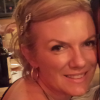
Sisters From Another Mister ...
A blog born from the love of 'sisters' around the world who come together to lift eachother up no matter where they are on their life journey.
Meet Nicole, a transplanted British born, South African raised, and American made Mom of two girls living on the sunny shores of South Florida, USA. A writer of stories, an avid picture taker and a keeper of shiny memories.
Sharing the travels of a home school journey that takes place around the globe - because 'the world truly is our classroom'. Throw in infertility, adoption, separation, impending divorce (it has its own Doom and Gloom category on the blog) and a much needed added side of European humor is what keeps it all together on the days when it could quite clearly simply fall apart! This segues nicely into Finding a Mister for a Sister for continued amusement.
When not obsessing over the perils of dating as an old person, saving the world thro organisations such as being an ambassador for shot@life, supporting GirlUP, The UN Foundation, ONE.org and being a member of the Global Team of 200 for social good keeps life in the balance.
Be sure to visit, because 'even tho we may not have been sisters at the start, we are sisters from the heart.'
http://www.sistersfromanothermister.com/
https://www.facebook.com/SistersFromAnotherMister
https://twitter.com/thesistershood
http://pinterest.com/thesistershood/
Global Team of 200 #socialgoodmoms
Champion for Shot@Life and The United Nations Foundation
More Posts - Website
Follow Me:




by Tinne from Tantrums and Tomatoes | Nov 11, 2013 | 2013, Being Thankful, Belgium, Childhood, Competition, Contest, Education, Family, Girls, Husband, Life Lesson, Parenting, Relationships, Siblings, Tantrum and Tomatoes, World Motherhood, Younger Children
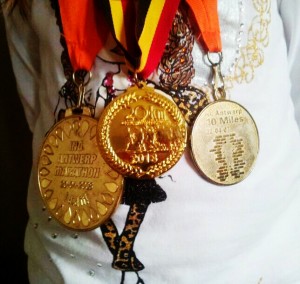 There is no denying that my eldest child is competitive.
There is no denying that my eldest child is competitive.
Fiercely competitive.
The kind which makes for a future Olympic-Gold-Medal winner – competitive.
She needs to be first. Perhaps it has something to do with the fact that she is the oldest, but I suspect it is just part of her genetic make up.
Her father has the same drive to always do better than the rest, to drive himself towards new goals, to be better, faster, to force his body into running a marathon and to try to improve his time again and again and again. And he is willing to suffer for it, to endure muscle cramps, to run until his energy levels have been completely depleted and he is more dead than alive.
I’m not like that, neither is n°2. We are happily just pottering about, going about our business and we will get there in the end. So what if it takes us hours, weeks or months. So what if we don’t finish first. We ran, didn’t we? We did our part. Besides I do not like discomfort, mentally or physically.
Like so many characteristics, my daughter’s competitiveness is a two sided sword.
It is what drove her to learn how to ride a bike without training wheels in just two days, simply because a boy in her class could do it and if that boy could do it then there was no reason why she shouldn’t be able to as well.
It got her out of diapers so quickly simply because her friend was also potty training and she wanted to be first.
But there is a downside as well. Being only four, she aims to be first in just about everything she does. And I really do mean e-ve-ry-thing . Whether it is rolling in the dust, dressing herself, putting olives on a pizza, eating said pizza, learning how to count to 20, spelling out her own name AND that of mommy, to her it is a competition. She will try to ‘win’ at it, do a victory dance when she ‘wins’ and be inconsolable when she doesn’t.
There have been many conversations about how winning is nice but not so important that you need to bawl your eyes out when some other kid takes the prize and that she cannot always be first. That is OK not to always win, not to be top in everything and that there are some things, that I’m sorry my dear darling, you will not be able to do.
This – I have to admit – will be a though lesson for her to learn. And she will have to learn it, otherwise she’ll be a pill-popping, nervous wreck by the time she is 16.
And she will have to find a way to turn that competitiveness into something positive.
But there is the glitch in the whole affair. How will she learn?
Through experience? Will it just click one day? Will she simply just realize that she is not musical (she has inherited my signing voice, which sounds like a chorus of warthogs high on helium), that she cannot really jump that high. Will she be sad, will she cry, will she regret it her whole life or… will she just simply accept. Accept that yes, she sucks at music, dancing, mathematics, but hey, she has a knack for drawing awesome portraits and makes a killer brownie, so what the heck …
How did you or your child come to terms with the fact that there is something that you or s/he just is not good at?
This is an original post to World Moms Blog from our mother of two in Belgium, Tantrums and Tomatoes.
Born in Belgium on the fourth of July in a time before the invention of the smart phone Tinne is a working mother of two adorably mischievous little girls, the wife of her high school sweetheart and the owner of a black cat called Atilla.
Since she likes to cook her blog is mainly devoted to food and because she is Belgian she has an absurd sense of humour and is frequently snarky. When she is not devoting all her attention to the internet, she likes to read, write and eat chocolate. Her greatest nemesis is laundry.
More Posts - Website
Follow Me:















 There are just no words these days to describe what has happened to my beautiful country. I write this from the capital of Manila, which was spared the catastrophic effects of the world’s strongest recorded typhoon, Haiyan, which befell our country last November 8.
There are just no words these days to describe what has happened to my beautiful country. I write this from the capital of Manila, which was spared the catastrophic effects of the world’s strongest recorded typhoon, Haiyan, which befell our country last November 8. 








